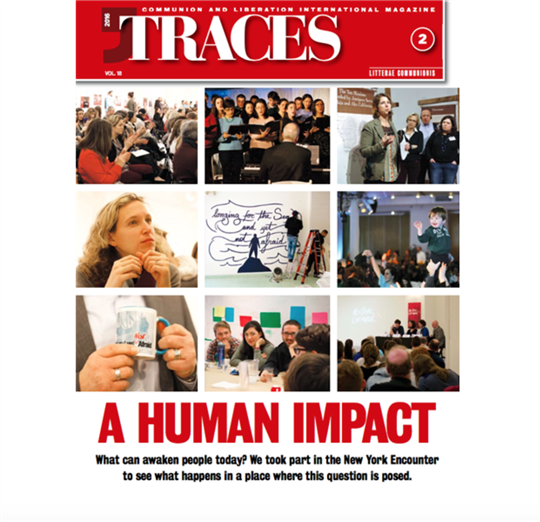
Traces N.2, February 2016
Today For YouThat contribution can we Christians make to today’s troubled world? Everyone sees the suffering, and in varied ways it is in everyone’s life. It takes the form of what is happening on the global stage: terrorism, a “world war fought piecemeal,” the tearing away of foundational elements of society, such as the family. It is felt in the weight of the shift of our person in our everyday struggles lived out at home, at work, in our studies–that sometimes seem to suffocate us, suffocate and stifle us.
In this way we often think that reality, above all when it is harsh, is not made for us, holds nothing good for us. We sense within ourselves an inextinguishable desire for happiness, an open wound, a hollowness that constantly drives us to seek something else, because as Cesare Pavese said, “What man seeks in pleasures is the infinite.” But we find nothing that truly and fully fills this void. Thus, we end up believing that our heart is destined for nothingness. We think that perhaps, to use Franz Kafka’s image, there is a “point of arrival” for this desire, but “no way to get there.”
How does Christianity respond to this nothingness? How does it help me, and thus, the world? For there is no help we can give our fellow human beings that does not pass through our own “I.” Do we help with a more acute analysis of the situation, or some extra initiative? Or is there something else?
This question forms the theme running through this issue of Traces. We explore it following the road indicated by Fr. Luigi Giussani, the founder of CL, who died in February 2005. You will find some articles that will help you learn more about him and the reality to which he gave life (and that, thanks to God, is alive and kicking all over the globe, from Kenya to the heart of New York). In a 1994 lesson to the university students (later entitled Recognizing Christ), Fr. Giussani showed the nature of a life entirely spent in announcing to thousands of young people that there is a road: it is Christ, present here and now, as He was two thousand years ago. “He wasn’t yesterday. He is today, for you, whatever your position,” he said in that lesson. Christ is a fact, present, not a collection of ideas or precepts, but a face to recognize. Where and how? In reality, in the changed lives of those who follow Him, and in the life that is born when people keep their gaze fixed on Him; a life that questions, churns, and produces an impact in one’s innermost depths, moves one deeply. Christianity is not “just one more thing to do,” but “a subversive and surprising way to live the usual things,” as Fr. Giussani once said. It is a fullness that enables us to breathe freely, to live anywhere and to face any situation
with gladness.